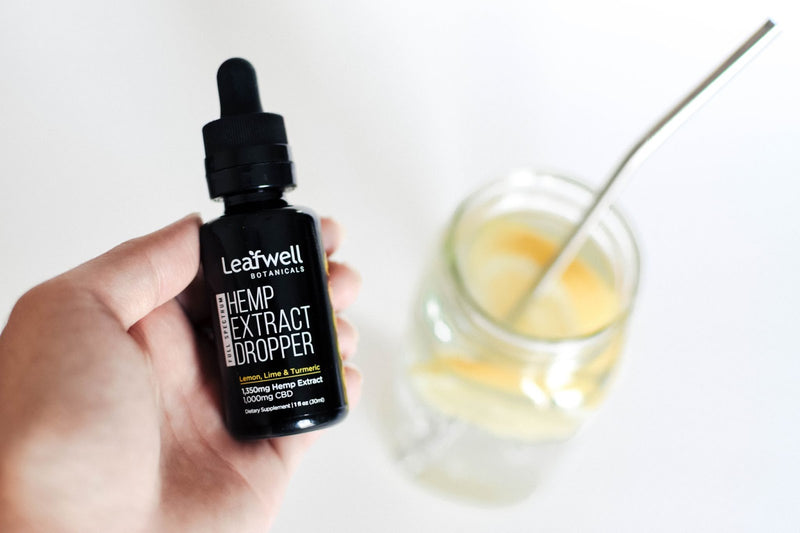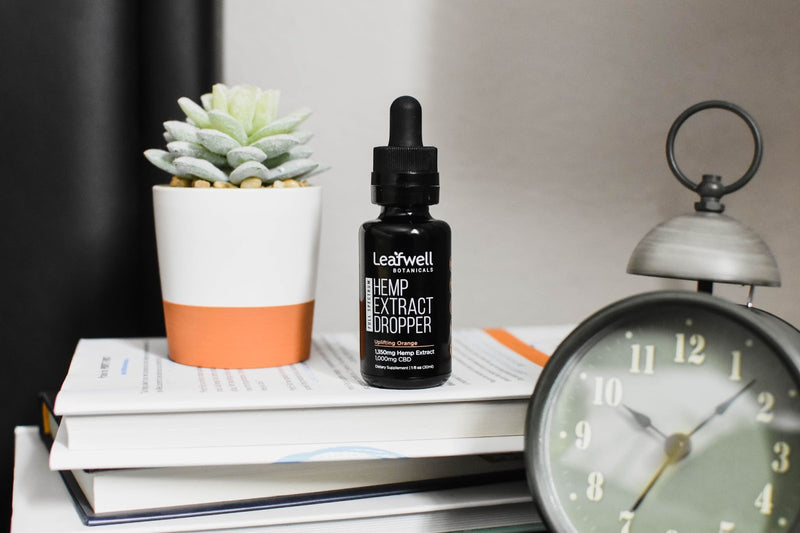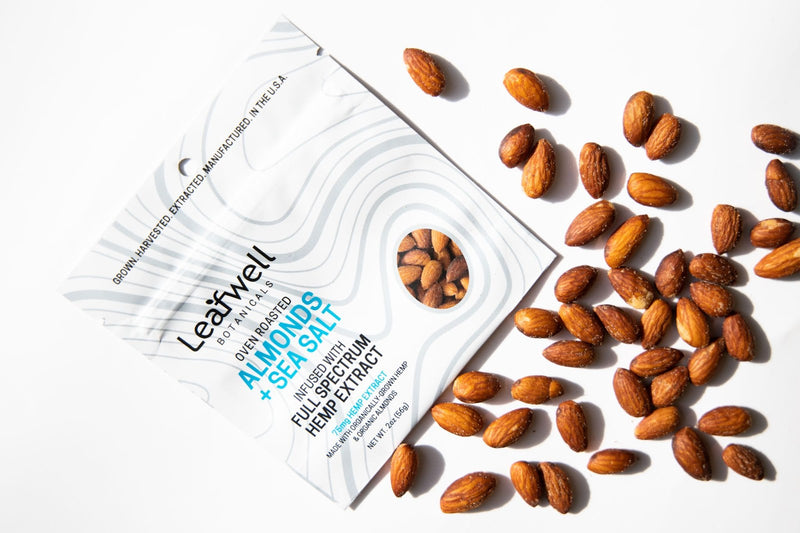Does CBD Oil Get You High? What to Know About CBD and THC

CBD oil is a pretty incredible supplement. People use it to support their mental wellness, improve the quality of their sleep, and even to help them relax. Topical CBD can help nourish your skin and soothe your skin by interacting with the receptors found in your skin. Accompanying ingredients are particularly important for topicals to deliver the best effects. Even pets can benefit from the calming effects of CBD.
CBD is sometimes associated (less and less each day) with marijuana, and you may be nervous that taking CBD will cause intoxicating side effects. Or hey, maybe you would not mind that from your CBD supplement--we don’t judge!
Fortunately for you (or not!), CBD does not cause any high whatsoever.
Do you know what cannabinoids are? Or, have you ever heard of the endocannabinoid system?
Once you have read this article, you will understand what these terms are and why they are relevant to CBD and THC. Better still, we will give you the basics on what you need to know about CBD and THC, and give you a better understanding as to why CBD oil won’t get you high.
Let’s begin!
What does it mean to get high?
Before we answer whether or not CBD oil can get you high, it may be helpful to first explain what exactly getting high means.
See, if you have never experienced it, you may not fully understand what to expect. Unfortunately, it can be kind of hard to predict how your body will react to getting high as everyone’s experience is different and varies depending on how the THC was taken (edibles, inhaled, etc.) and can be influenced by whether or not they’re nervous to begin with.
A high is your body’s response to any type of intoxicating drug, though it is most often associated with marijuana consumption. All people experience highs uniquely, and like almost everything, sometimes that means negatively. One of the most common side effects of being high is paranoia.
We will go over the basics around getting highs a little later, but there are a few factors that may affect the state of your high. Dose, method of ingesting (inhaled which has multiple options, edibles, sublinguals, suppositories, among others), experience level, overall body makeup, and how you’re feeling prior to getting high (for example being nervous or worried) can help determine what kinds of side effects you may receive from your high.
For example, the more marijuana or the stronger marijuana (e.g., concentrates) you use, the more intense your high will be in most cases. Or, the more inexperienced you are, the more likely you will be to experience negative reactions if you’re nervous about it or are worried about something.
Though some of these side effects may be worrying for some, these are just some examples of what may occur when you are high, so you can understand the full range of possibilities and is by no means meant to portray THC negatively. Remember, all humans will react to getting high in their own way.
The important thing to note is that being high is completely different from just being a little bit more relaxed. A high is a euphoric state (which can be expressed via an extreme sense of relaxation), while relaxation in itself can occur without the use of an intoxicant.
All this to say both intoxicants and non intoxicants have their places, and we’re incredibly happy to see the shift in acceptance of both marijuana and hemp. Now let’s move onto diving a little deeper to answer the question in the title.
What is the Difference Between CBD and THC?
This breakdown of CBD and THC will help you get a basic introduction to the two compounds. However, to start, we first need to define what cannabinoids are:
What Are Cannabinoids?
Cannabinoids are naturally-occurring compounds that are present primarily in the cannabis plant family, although they can be found in other types of plants as well. The human body also produces cannabinoids of its own, called endocannabinoids.
There are well over 100 known cannabinoids, of which the most popular include:
- Cannabidiol (CBD)
- Tetrahydrocannabinol (THC)
- Cannabinol (CBN)
- Cannabigerol (CBG)
- Cannabichromene (CBC)
All of the cannabinoids that were listed above, such as CBD and THC, fall into the category of phytocannabinoids. When you consume any product containing phytocannabinoids, they will interact with your endocannabinoid system, which plays a heavy role in the duties in several bodily systems that influence sleep, mood, balance, and much more!
What is the Endocannabinoid System?
The endocannabinoid system plays a heavy role in the body’s day to day functions, and is composed of enzymes which help break down cannabinoids and receptors (CB1 and CB2). These receptors are present all over the body, although there is a high concentration of CB1 receptors within the central nervous system, and CB2 receptors within the peripheral nervous system in particular.
Scientists only discovered the endocannabinoid system in the 1990s, so there is still much more to study on how exactly the endocannabinoid system functions within the body and some research has shown that there may even be a CB3 receptor but there’s still work being done. Expect a lot more in the years to come with the ECS!
However, scientists are sure of these three things:
- Though the endocannabinoid system is a part of the nervous system, it also can affect the brain, connective tissues, glands, various organs, the GI tract, the immune system, and much more (being discovered everyday!).
- Receptors within the endocannabinoid system regulate many integral processes within the body, including pain, memory, inflammation, mood, appetite, metabolism, coordination, sleep, and much more.
- Your body’s own endocannabinoids and when you consume phytocannabinoids, they interact with the components within the endocannabinoid system. This means that phytocannabinoids like CBD and THC can potentially influence processes that the endocannabinoid system plays a role in.
So, how exactly do THC and CBD affect the endocannabinoid system and the body as a whole?
What is THC?
THC, or tetrahydrocannabinol, is a cannabinoid that is derived from some cannabis plants. It is found in particularly high concentrations in marijuana (whereas hemp plants contain a max of 0.3% THC). THC is the intoxicating ingredient within marijuana that causes the signature high. There are many different ways to take THC, including smoking and edibles most predominantly.
When you consume THC, it makes its way into your bloodstream and eventually finds receptors from the endocannabinoid system to interact with. Getting high occurs when THC reaches receptors in the brain and signals parts of the brain to stop sending off neurotransmitters (chemical signals) to the rest of the body. Though researchers have yet to determine everything else that happens and causes the full extent of feeling high due to limited capabilities to research due to THC being a schedule 1 drug.
When consuming THC, it is possible you may experience some of the side effects listed in the earlier section. Keep that in mind, especially if it’s your first time consuming THC, if you’re feeling particularly nervous, or if you’re trying something new. We recommend enjoying with company! Like with anything else, if you’re suffering from any medical conditions, taking medication, or are pregnant, we always recommend talking with a medical professional or abstaining if you’re unsure.
What is CBD?
CBD, or cannabidiol, is a cannabinoid that is naturally found in cannabis plants. CBD is present in high concentrations in both marijuana and hemp plants. It is safe and non-intoxicating, meaning it does not cause a high.
CBD has many benefits for both humans and pets. To name a few, CBD may be able to help improve your quality of sleep, promote a sense of relaxation, and support mental health.
You can consume CBD using tinctures, capsules, edible items, topicals, and more!
What is the Difference Between CBD and THC?
The main difference between CBD and THC is that THC is intoxicating and CBD is not. In other words, CBD does not get you high.
To dive in a little deeper, while there is still much research to do in order to better understand how it all works early research points to the fact that THC is an agonist which means that it binds to receptors and spurs activity while CBD has been shown to be an antagonist which means it binds to the receptor and actually stops the receptor from producing a response.
In addition, while marijuana contains high levels of THC, terpenes, and in some cases small amounts of CBD and other cannabinoids, hemp plants must have less than 0.30% THC, and high amounts of CBD (can be up to 20% in some genetics) and other minors.
When you use any sort of hemp extract or CBD oil product (from a reputable, high quality brand such as Leafwell Botanicals of course!), you should not experience any sort of high. Instead, you will get to experience all of the amazing, relaxing benefits of CBD oil.
In Conclusion
CBD and THC are two of the most popular cannabinoids that come from cannabis plants. Unlike THC, CBD does not have intoxicating properties, and will not cause you to get high.

Here at Leafwell Botanicals, we use only organically grown, USA-grown hemp in our high quality CBD products. To enhance your overall health, take your daily routine to the next level, and thrive in life, look no further than right here.
Sources
Does CBD Get You High? Understand the Difference between CBD and THC (healthline.com)
Does CBD Get You High? Here's What Experts Say | The Healthy
Does CBD get you high? What to know about CBD and THC (medicalnewstoday.com)
CBD: understanding how CBD works with our bodies (healtheuropa.eu)







